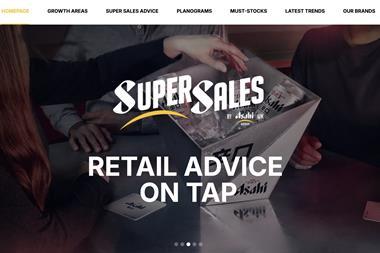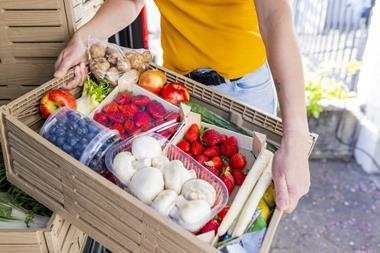In the middle of a downturn, diversifying into a full-on hot food-to-go operation may just be a pipe dream for many. Yet there is a way of getting a piece of the action without risking all.
Plenty of c-store retailers are trying out hot beverage machines as a way of gauging how successful an all-singing, all-dancing hot food-to-go operation would be with their customers before splashing around the big money.
Generally, hot beverage machines require little maintenance and offer high margins for the amount of space they take up.
And the timing couldn't be better as chilly customers seek out a reasonably priced pick-me-up in the cold winter mornings and look to their local c-store to provide it.
Mark Rhodes, marketing manager at machine supplier Westomatic, believes the downturn also makes it a perfect time to break into the market. "Due to the current economic climate many office workers appear to be shunning their daily outing to the local coffee shop in favour of coffee on the go," he says.
"A hot beverage machine in a c-store offers premium tasting drinks at a fraction of the cost of high street coffee shops."
Max Jenvey of food-to-go consultancy Oxxygen Marketing Partnership says that even though consumers are watching what they spend on hot beverages, they're not skimping on quality.
"Customer expectation levels have increased over the past 10 years," he says. "Tea and coffee generates a high profit margin, up to 80% in some cases, so whatever level of hot beverage offering you opt for, it will make an excellent addition to any food to go."
According to Jenvey, there are several levels of hot beverage installation to choose from. "First is the cassette coffee and tea system. It's a very basic offer, utilising a hot water boiler within a dispensing machine into which the customer or retailer inserts the coffee or tea cassette," he says. "The benefits for the retailer are that this system is very low cost, low maintenance and customers can serve themselves.
"The second option is the classic 'pour and serve' filter coffee favoured by the US market. Again this offer is low cost and low maintenance, but unlike the cassette systems the shelf life of each jug produced is only 30 minutes maximum. Waste and quality are two areas to watch out for using this method."
Jenvey points out that the third option is the automated bean-to-cup machine. "Machine prices vary from £1,500 right up to more than £6,000, and there are numerous suppliers of branded and unbranded offers."
He adds that retailers considering this option will need to work out how many cups they are likely to shift a day before deciding on which machinery to go for and how much of an investment to make.
"If a retailer is buying in a machine at this level, they should ask themselves how many cups a day they anticipate selling," says Jenvey. "If it is below 50 then they may want to consider a lower-cost machine. However, if they are looking at 50+ cups per day then it is worthwhile investing in a higher-spec model. Stores can charge a premium for these beverages as the quality is far superior and more in keeping with what customers demand."
There is also a fourth option for those wanting to provide the real coffee shop experience. "The fourth option is a semi-automatic or full barista offer which involves intensive staff training, equipment investment, not to mention the space allocation in store," says Jenvey. "Even though a barista machine involves more expertise it also generates more customer attraction as coffee connoisseurs enjoy the theatre, quality and craftsmanship only a true barista delivers."
While the razzmatazz of this system may appeal, Jenvey advises starting small. "Start with a pour and serve machine and work your way up from there. After all, experience is priceless and what's the point in investing in a costly offer if you have no experience?
"Hot beverage machines don't suit every store so dip your toe into the water before making a massive investment."
As well as demand, another important aspect for retailers to consider is cost. Westomatic's range starts at £1,995 for an entry-level bean-to-cup machine, but it does offer a leasing option for retailers who are wary about shelling out upfront.
Food-to-go supplier Country Choice has two levels of machine on offer. The first is a medium volume machine that produces 100 cups a day which costs £2,700, and a higher volume machine that produces 300 cups a day priced at £5,900. Country Choice also offers a payback period of up to five months.
Most suppliers will also organise the installation of the machine, leaving you to simply plug in and begin brewing.
Plenty of c-store retailers are trying out hot beverage machines as a way of gauging how successful an all-singing, all-dancing hot food-to-go operation would be with their customers before splashing around the big money.
Generally, hot beverage machines require little maintenance and offer high margins for the amount of space they take up.
And the timing couldn't be better as chilly customers seek out a reasonably priced pick-me-up in the cold winter mornings and look to their local c-store to provide it.
Mark Rhodes, marketing manager at machine supplier Westomatic, believes the downturn also makes it a perfect time to break into the market. "Due to the current economic climate many office workers appear to be shunning their daily outing to the local coffee shop in favour of coffee on the go," he says.
"A hot beverage machine in a c-store offers premium tasting drinks at a fraction of the cost of high street coffee shops."
Max Jenvey of food-to-go consultancy Oxxygen Marketing Partnership says that even though consumers are watching what they spend on hot beverages, they're not skimping on quality.
"Customer expectation levels have increased over the past 10 years," he says. "Tea and coffee generates a high profit margin, up to 80% in some cases, so whatever level of hot beverage offering you opt for, it will make an excellent addition to any food to go."
According to Jenvey, there are several levels of hot beverage installation to choose from. "First is the cassette coffee and tea system. It's a very basic offer, utilising a hot water boiler within a dispensing machine into which the customer or retailer inserts the coffee or tea cassette," he says. "The benefits for the retailer are that this system is very low cost, low maintenance and customers can serve themselves.
"The second option is the classic 'pour and serve' filter coffee favoured by the US market. Again this offer is low cost and low maintenance, but unlike the cassette systems the shelf life of each jug produced is only 30 minutes maximum. Waste and quality are two areas to watch out for using this method."
Jenvey points out that the third option is the automated bean-to-cup machine. "Machine prices vary from £1,500 right up to more than £6,000, and there are numerous suppliers of branded and unbranded offers."
He adds that retailers considering this option will need to work out how many cups they are likely to shift a day before deciding on which machinery to go for and how much of an investment to make.
"If a retailer is buying in a machine at this level, they should ask themselves how many cups a day they anticipate selling," says Jenvey. "If it is below 50 then they may want to consider a lower-cost machine. However, if they are looking at 50+ cups per day then it is worthwhile investing in a higher-spec model. Stores can charge a premium for these beverages as the quality is far superior and more in keeping with what customers demand."
There is also a fourth option for those wanting to provide the real coffee shop experience. "The fourth option is a semi-automatic or full barista offer which involves intensive staff training, equipment investment, not to mention the space allocation in store," says Jenvey. "Even though a barista machine involves more expertise it also generates more customer attraction as coffee connoisseurs enjoy the theatre, quality and craftsmanship only a true barista delivers."
While the razzmatazz of this system may appeal, Jenvey advises starting small. "Start with a pour and serve machine and work your way up from there. After all, experience is priceless and what's the point in investing in a costly offer if you have no experience?
"Hot beverage machines don't suit every store so dip your toe into the water before making a massive investment."
As well as demand, another important aspect for retailers to consider is cost. Westomatic's range starts at £1,995 for an entry-level bean-to-cup machine, but it does offer a leasing option for retailers who are wary about shelling out upfront.
Food-to-go supplier Country Choice has two levels of machine on offer. The first is a medium volume machine that produces 100 cups a day which costs £2,700, and a higher volume machine that produces 300 cups a day priced at £5,900. Country Choice also offers a payback period of up to five months.
Most suppliers will also organise the installation of the machine, leaving you to simply plug in and begin brewing.
































No comments yet